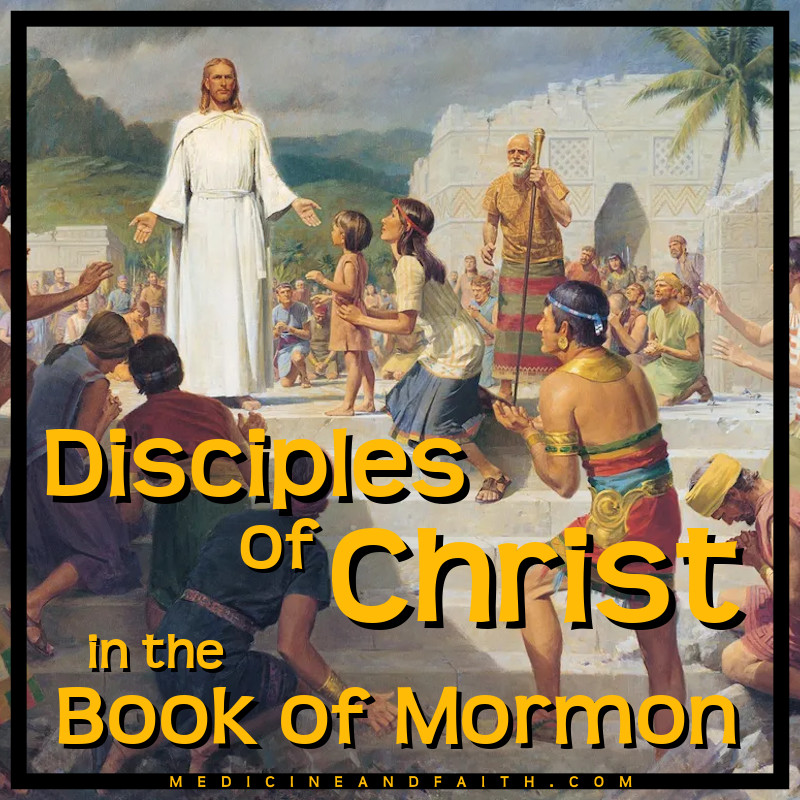Imagine that you are leaving Jerusalem as a religious refugee in 600 BC, and you are traveling through the wilderness to your promised land. I have a serious question for modern people to ponder: would you rather take the Liahona or your smart phone with you?
For the sake of argument, and to level the playing field a bit, let’s say that your phone will work just as well in that time and place as it does today. It will have access to network, maps, GPS satellites, and the entire knowledge base available on the World Wide Web, including the online Church resources. Also, let’s say that you will have a source of electricity to keep the phone charged.
Which one would you choose?
Liahona: Tried and True
First, a bit of background for those who may be less familiar: what is the Liahona, and what can it do?
The Book of Mormon begins with the story of a family that leaves Jerusalem in 600 BC, just a few years before the Babylonian captivity. They were led by father Lehi, who was a prophet of the Lord. They traveled through the desert for eight years before crossing the sea to their Promised Land in the ancient Americas. Early in their journey this family was given a gift from God to help them find their way.
“And it came to pass that as my father arose in the morning, and went forth to the tent door, to his great astonishment he beheld upon the ground a round ball of curious workmanship; and it was of fine brass. And within the ball were two spindles; and the one pointed the way whither we should go into the wilderness” (1 Nephi 16:10)
They called this gift the Liahona, which meant “a compass” in their language. In subsequent weeks they learned more about its functions and features:
“And it came to pass that I, Nephi, beheld the pointers which were in the ball, that they did work according to the faith and diligence and heed which we did give unto them.
“And there was also written upon them a new writing, which was plain to be read, which did give us understanding concerning the ways of the Lord; and it was written and changed from time to time, according to the faith and diligence which we gave unto it” (1 Nephi 16:28-29).
This remarkable tool, disguised as a mechanical device, was actually a sort of faith-o-meter. The Lord could judge their hearts by how well they followed the directions it gave, and the device stopped working altogether if they didn’t believe, or if they failed to act on their belief. For many years it led them through “the more fertile parts of the wilderness,” where they could “obtain food for [their] families,” and it helped them to “guide the ship […] towards the promised land.” From these passages we can summarize a “feature list” for the Liahona:
- points the way to go
- changing text provides periodic instruction from the Lord
- function of device provides feedback/insight into user’s spiritual state
Smart Phone: Bells and Whistles Galore
The feature list of a smart phone is really almost endless when you consider that there’s an app for just about anything you might hope to do with your phone. Here is a short list of the most important and useful functions for a family wilderness survival experience:
- maps with GPS navigation
- weather forecasts
- online survival tutorials
- various communications functions
- flashlight
- baby/child entertainer
- battery terminals could be used to start fire
You notice right away that our fancy-pants modern gizmo can do a lot of things which Lehi’s device couldn’t do. But how well does it replicate or replace the Liahona’s core functions?
Well, a smart phone can certainly point you in the way to go, assuming you know where you want to go. But even if you don’t, it can help you avoid sheer cliffs and other obstacles, and can help you stay close to water, human settlements, etc. Unfortunately a smartphone app can’t really assure that you are going in the direction that the Lord wants you to go — that’s a tall order for a computer algorithm.
But the smart phone can provide messages from the Lord in the form of scriptures and General Conference addresses in the Gospel Library app, and the latter is even “changed from time to time” when there is a new Conference. And we might even give the smart phone a bonus point here, because you won’t have to carry the brass plates around.
Can a smart phone act as a faith-o-meter? Clearly not. The phone will keep working regardless of whether you believe in the Lord or follow his guidance.
It also bears mentioning here that a smart phone can do a lot of things that would be entirely useless and even counterproductive on your journey. An addictive game could distract you from doing an essential survival task, for instance.
Here is a summary table of our comparison:
| Function | Liahona | Smart Phone |
| Points the way to go | + | +/- |
| Changing text provides periodic instruction from the Lord | + | + |
| Faith-o-meter | + | – |
| GPS navigation, weather reports, survival tutorials, etc | – | + |
| Distractions: addictive games, social media, pornography, etc. | – | + |
More on Those Distractions
The smart phone revolution is a huge natural experiment, where an entire society jumped headfirst into a new way of communicating, before the pitfalls and tradeoffs were well understood. It’s hard to remember that just over a decade ago these ubiquitous devices didn’t even exist. Smart phones give you 24/7 on-demand access to everything happening on the internet: news, entertainment, collaborative encyclopedias, all categories of immoral filth, politics, hobby forums, step-by-step instructions for any project you can imagine, conspiracy theories, cat memes and other lightminded uselessness, etc.
And the invention of social media at about the same time as the smart phone produced a perfect storm of an incredibly addictive activity housed on a small personal device that is always with you. Any time you crave that chemical reaction in your brain you pull out your phone and check for notifications. The motion of turning your phone towards your face and unlocking it becomes second nature and automatic; you do it when you sit down on the toilet, when you are in the middle of a conversation with another person, while eating, at the park playing with your kids, while driving.
Society is beginning to recognize that there are downsides to having a smartphone. For example, in the October 2019 General Conference Stephen B. Owen, the Young Men General President, told the following story:
“Not long ago I woke up and prepared to study the scriptures. I picked up my smartphone and sat in a chair next to my bed with the intention of opening the Gospel Library app. I unlocked my phone and was just about to begin studying when I saw a half dozen notifications for text messages and emails that had come during the night. I thought, “I’ll quickly check those messages, and then I’ll get right to the scriptures.” Well, two hours later I was still reading text messages, emails, news briefs, and social media posts. When I realized what time it was, I frantically rushed to get ready for the day. That morning I missed my scripture study, and consequently I didn’t get the spiritual nourishment I was hoping for.
“I’m sure many of you can relate. Modern technologies bless us in many ways. They can connect us with friends and family, with information, and with news about current events around the world. However, they can also distract us from the most important connection: our connection with heaven.”
I have a hard time imagining Nephi fiddling with the Liahona for an hour, completely ignoring his toddler who is trying to get his attention the whole time. But anyone who has owned a smart phone probably did something like that on the first day they got it. What will happen to our children when they grow up with less parental attention because all of the adults are staring at their phones? Or worse: what will happen to our kids who grow up constantly staring at their own 5-inch screens instead of interacting with the human beings in physical space all around them?
Tap Your Inner Luddite
I have a few personal rules for my phone, which I developed over time to counter some of these negative effects. The first, and most important thing, is to put a throttle on your social media access on the mobile device. This was discussed in my previous post, so I won’t rehash that here.
For over a year I have been leaving my phone in my office when I see patients in my clinic, because I don’t want telephone calls or text message notifications to interrupt my patient interactions. I check for messages and missed phone calls between patients. After doing this for a few months I decided to do the same thing at home, so that I am not tempted to pull out my phone and ignore my children during family time. When I am home the phone is (hopefully) on my dresser or on my nightstand.
I want to connect with my children, looking them in the eyes as much as possible when they talk to me, and I shouldn’t make them compete with my phone for my attention. I’m not perfect at this yet, but I’m getting better at it. My daughter recently said, “I remember you used to read on your phone at dinner time and now you don’t do that any more. You talk to us instead. It’s nice.”
This same daughter was in a seminary class where the teacher conducted an experiment. He banned all electronic devices from his classroom for several weeks. My daughter reported that it made a big difference to how the class felt. She said, “When people were not on their phones, it made everyone more focused on the lesson, and it allows the Spirit to be there.”
Have You Decided Yet?
Returning to our original question, which device do you choose? If you choose the Liahona then you can be assured that the Lord will guide you, as long as you have faith and diligently heed his directions. But you will have to leave your phone behind. No internet, no maps, no messaging, no online survival skill tutorials, and no posting your daily adventures or crowdsourcing your next decisions on social media. Choosing the smart phone, on the other hand, will give you access to fantastic and useful functions, which you might not be able to live without (literally). You will also have guidance from the Lord if you choose to use it and don’t drown it out with distractions. But those distractions will surely call to you, occasionally pulling your focus away from what’s really important.
Of course, we can’t actually choose the Liahona today, because only God can distribute them, and he doesn’t seem to be doing that anymore. (Apparently the one he gave Lehi was a limited edition.) And most of my readers are not refugees in the Arabian desert. Lehi’s experience was his and not ours.
But the challenge of all scripture is to liken it unto yourself. Our physical, social, and spiritual challenges today are different but just as consequential, intense, and dangerous as Lehi’s were. And the Lord’s grace is no less efficacious for us than it was for them. Just like them we can be “led by the Spirit, not knowing beforehand the things which [we] should do.” We can “go and do the things which the Lord hath commanded,” with full confidence that “he shall prepare a way for [us] that [we] may accomplish the thing which he commandeth” (1 Nephi 3:7).
The point of this thought experiment was to put you in Lehi’s shoes for a few minutes and imagine how a modern tool could have helped or hindered him on his journey. But then realize that you are on the same journey, at least metaphorically, and take a second look at that tool in your hand. Ask yourself:
- Is this device helping me or hindering me?
- Could I use it more effectively or efficiently?
- Am I its master or its slave?
To paraphrase Jesus, we could say, “If thy [smart phone] offend thee, cut [it] off, and cast [it] from thee: it is better for thee to enter into life [without a phone], rather than having [a phone] to be cast into everlasting fire” (see Matt 18:8-9). I don’t think he really wants us to become extreme Luddites, any more than he wants us to cut off our own hands or feet. But it is still just as dangerous to “worship the work of [our] own hands” as it was in ancient days.
My wife read a draft of this post and said, “Here’s the real question: would we be willing to give up all modern communication devices if necessary, to get the Liahona for ourselves right now? Is your heart ready, or would you be willing to get it ready, to sacrifice anything to be in touch with the Lord, all the time?”
We don’t have the Liahona today, but we have other tools to help us. Like all tools, they can be used for good or for evil or for stupid. How are we using ours?




